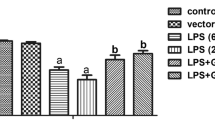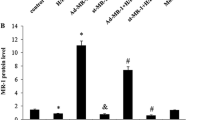Abstract
Tumor necrosis factor-alpha (TNF-α), a proinflammatory cytokine involved in mitogen-activated protein kinase (MAPK) signaling pathways, contributes to the pathogenesis of cardiovascular diseases. Recently, suppressor of cytokine signaling-1 (SOCS-1) has been shown to modulate responses to TNF-α. However, whether SOCS-1 suppresses TNF-α-dependent apoptotic processes in cardiomyocytes and whether MAPK pathways mediate this effect have not been clearly elucidated. This study was carried out to define the role of SOCS-1 on TNF-α-induced apoptosis in neonatal rat cardiomyocytes and to investigate the signal pathways involved. Exposure to TNF-α (10 ng/ml for 24 h) significantly increased the number of apoptotic cells, the activity of caspase-8 and caspase-3, and the Bax/Bcl-xl ratio. In contrast, adenovirus-mediated gene transfer of SOCS-1 reversed the pro-apoptotic effect of TNF-α. Additionally, preincubation of cardiomyocytes with the extracellular signal-regulated kinase-1 and -2 (ERK1/2) inhibitor PD98059 attenuated the protective effect of SOCS-1, but the p38-MAPK inhibitor SB203580 and the c-Jun amino-terminal kinase (JNK) inhibitor SP600125 had no effect. Furthermore, the TNF-α-induced decrease in the phosphorylation of ERK1/2 was abolished by overexpression of SOCS-1. These findings suggest that SOCS-1 prevents TNF-α-induced apoptosis in cardiac myocytes via ERK1/2 pathway activation.




Similar content being viewed by others
Abbreviations
- SOCS-1:
-
suppressor of cytokine signaling-1
- TNF-α:
-
tumor necrosis factor-alpha
- ERK1/2:
-
extracellular signal-regulated kinase-1 and -2
- MAPK:
-
mitogen-activated protein kinase
- JNK:
-
c-Jun amino-terminal kinase
- JAK:
-
Janus kinase
- STAT:
-
signal transducers and activators of transcription
References
Meldrum, D. R. 1998. Tumor necrosis factor in the heart. Am. J. Physiol. 274:R577–595.
Bryant, D., L. Becker, J. Richardson, J. Shelton, F. Franco, R. Peshock, M. Thompson, and B. Giroir. 1998. Cardiac failure in transgenic mice with myocardial expression of tumor necrosis factor-alpha. Circulation 97:1375–1381.
Irwin, M. W., S. Mak, D. L. Mann, R. Qu, J. M. Penninger, A. Yan, F. Dawood, W. H. Wen, Z. Shou, and P. Liu. 1999. Tissue expression and immunolocalization of tumor necrosis factor-alpha in postinfarction dysfunctional myocardium. Circulation 99:1492–1498.
Habib, F. M., D. R. Springall, G. J. Davies, C. M. Oakley, M. H. Yacoub, and J. M. Polak. 1996. Tumor necrosis factor and inducible nitric oxide synthase in dilated cardiomyopathy. Lancet. 347:1151–1155.
Song, W., X. Lu, and Q. Feng. 2000. Tumor necrosis factor-alpha induces apoptosis via inducible nitric oxide synthase in neonatal mouse cardiomyocytes. Cardiovasc. Res. 45:595–602.
Sugden, P. H., and A. Clerk. 1998. “Stress-responsive” mitogen-activated protein kinases (c-Jun N-terminal kinases and p38 mitogen-activated protein kinases) in the myocardium. Circ. Res. 83:345–352.
Aikawa, R., I. Komuro, T. Yamazaki, Y. Zou, S. Kudoh, M. Tanaka, I. Shiojima, Y. Hiroi, and Y. Yazaki. 1997. Oxidative stress activates extracellular signal-regulated kinases through Src and Ras in cultured cardiac myocytes of neonatal rats. J. Clin. Invest. 100:1813–1821.
Kubo, M., T. Hanada, and A. Yoshimura. 2003. Suppressors of cytokine signaling and immunity. Nat. Immunol. 4:1169–1176.
Morita, Y., T. Naka, Y. Kawazoe, M. Fujimoto, M. Narazaki, R. Nakagawa, H. Fukuyama, S. Nagata, and T. Kishimoto. 2000. Signals transducers and activators of transcription (STAT)-induced STAT inhibitor-1 (SSI-1)/suppressor of cytokine signaling-1 (SOCS-1) suppresses tumor necrosis factor alpha-induced cell death in fibroblasts. Proc. Natl. Acad. Sci. U. S. A. 97:5405–5410.
He, Y., W. Zhang, R. Zhang, H. Zhang, and W. Min. 2006. SOCS1 inhibits tumor necrosis factor-induced activation of ASK1-JNK inflammatory signaling by mediating ASK1 degradation. J. Biol. Chem. 281:5559–5566.
Sass, G., N. D. Shembade, and G. Tiegs. 2005. Tumour necrosis factor alpha (TNF)-TNF receptor 1-inducible cytoprotective proteins in the mouse liver: relevance of suppressors of cytokine signaling. Biochem. J. 385:537–544.
Chong, M. M., H. E. Thomas, and T. W. Kay. 2002. Suppressor of cytokine signaling-1 regulates the sensitivity of pancreatic beta cells to tumor necrosis factor. J. Biol. Chem. 277:27945–27952.
Kimura, A., T. Naka, S. Nagata, I. Kawase, and T. Kishimoto. 2004. SOCS-1 suppresses TNF-alpha-induced apoptosis through the regulation of Jak activation. Int. Immunol. 16:991–999.
Kang, P. M., and S. Izumo. 2003. Apoptosis in heart: basic mechanisms and implications in cardiovascular diseases. Trends. Mol. Med. 9:177–182.
Wencker, D., M. Chandra, K. Nguyen, W. Miao, S. Garantziotis, S. M. Factor, J. Shirani, R. C. Armstrong, and R. N. Kitsis. 2003. A mechanistic role for cardiac myocyte apoptosis in heart failure. J. Clin. Invest. 111:1497–1504.
Saraste, A., K. Pulkki, M. Kallajoki, K. Henriksen, M. Parvinen, and L. M. Voipio-Pulkki. 1997. Apoptosis in human acute myocardial infarction. Circulation 95:320–323.
van Empel, V. P., A. T. Bertrand, L. Hofstra, H. J. Crijns, P. A. Doevendans, and L. J. De Windt. 2005. Myocyte apoptosis in heart failure. Cardiovasc. Res. 67:21–29.
Swynghedauw, B. 1999. Molecular mechanisms of myocardial remodeling. Physiol. Rev. 79:215–262.
Szegezdi, E., A. Duffy, M. E. O’Mahoney, S. E. Logue, L. A. Mylotte, T. O’brien, and A. Samali. 2006. ER stress contributes to ischemia-induced cardiomyocyte apoptosis. Biochem. Biophys. Res. Commun. 349:1406–1411.
Cai, G., J. Zhang, L. Liu, and Q. Shen. 2005. Successful treatment of experimental autoimmune myocarditis by adenovirus-mediated gene transfer of antisense CIITA. J. Mol. Cell. Cardiol. 38:593–605.
Shen, J., D. O’Brien, and Y. Xu. 2006. Matrix metalloproteinase-2 contributes to tumor necrosis factor alpha induced apoptosis in cultured rat cardiac myocytes. Biochem. Biophys. Res. Commun. 347:1011–1020.
Barry, S. P. 2007. Role of the JAK-STAT pathway in myocardial injury. Trends. Mol. Med. 13:82–89.
Bishopric, N. H., P. Andreka, T. Slepak, and K. A. Webster. 2001. Molecular mechanisms of apoptosis in the cardiac myocyte. Curr. Opin. Pharmacol. 1:141–150.
Gustafsson, A. B., and R. A. Gottlieb. 2007. Bcl-2 family members and apoptosis, taken to heart. Am. J. Physiol. Cell. Physiol. 292:C45–51.
Naka, T., T. Matsumoto, M. Narazaki, M. Fujimoto, Y. Morita, Y. Ohsawa, H. Saito, T. Nagasawa, Y. Uchiyama, and T. Kishimoto. 1998. Accelerated apoptosis of lymphocytes by augmented induction of Bax in SSI-1(STAT-induced STAT inhibitor-1) deficient mice. Proc. Natl. Acad. Sci. U. S. A. 95:15577–15582.
Kaufmann, T., S. Schlipf, J. Sanz, K. Neubert, R. Stein, and C. Borner. 2003. Characterization of the signal that directs Bcl-x(L), but not Bcl-2, to the mitochondrial outer membrane. J. Cell. Biol. 160:53–64.
Grad, J. M., X. R. Zeng, and L. H. Boise. 2000. Regulation of Bcl-xL: a little bit of this and a little bit of STAT. Curr. Opin. Oncol. 12:543–549.
Feuerstein, G. Z., and P. R. Young. 2000. Apoptosis in cardiac diseases: stress- and mitogen-activated signaling pathways. Cardiovasc. Res. 45:560–569.
Xia, Z., M. Dickens, J. Raingeaud, R. J. Davis, and M. E. Greenberg. 1995. Opposing effects of ERK and JNK-p38 MAP kinases on apoptosis. Science 270:1326–1331.
Grethe, S., and M. I. Pörn-Ares. 2006. p38 MAPK regulates phosphorylation of Bad via PP2A-dependent suppression of the MEK1/2-ERK1/2 survival pathway in TNF-alpha induced endothelial apoptosis. Cell. Signal. 18:531–540.
Dhingra, S., A. K. Sharma, D. K. Singla, and P. K. Singal. 2007. p38 and ERK1/2 MAPKs mediate the interplay of TNF-alpha and IL-10 in regulating oxidative stress and cardiac myocyte apoptosis. Am. J. Physiol. Heart. Circ. Physiol. 293:H3524–3531.
Podewski, E. K., D. Hilfiker-Kleiner, A. Hilfiker, H. Morawietz, A. Lichtenberg, K. C. Wollert, and H. Drexler. 2003. Alterations in Janus kinase (JAK)-signal transducers and activators of transcription (STAT) signaling in patients with end-stage dilated cardiomyopathy. Circulation 107:798–802.
Acknowledgments
We would like to thank Professor Akihiko Yoshimura for providing pFLAG-CMV2-SOCS-1 plasmid. This work was supported by the Specialized Research Fund for the Doctoral Program of Higher Education in China (No.20070486103).
Author information
Authors and Affiliations
Corresponding author
Rights and permissions
About this article
Cite this article
Yan, L., Tang, Q., Shen, D. et al. SOCS-1 Inhibits TNF-α-Induced Cardiomyocyte Apoptosis via ERK1/2 Pathway Activation. Inflammation 31, 180–188 (2008). https://doi.org/10.1007/s10753-008-9063-5
Received:
Accepted:
Published:
Issue Date:
DOI: https://doi.org/10.1007/s10753-008-9063-5




